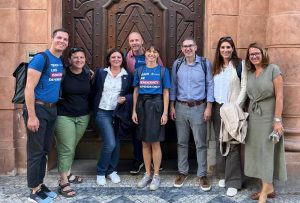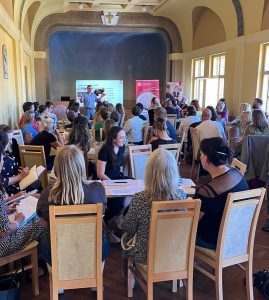By Laurel White
Near the end of their six-week professional development program in Madison last fall, three members of the Fulbright Teaching Excellence and Achievement (FTEA) program from the Czech Republic had an idea. They wanted to bring some of what they experienced at UW–Madison to other teachers in Central and Eastern Europe. After months of work and international networking, their idea was realized this fall at a one-day conference held in Prague and attended by more than 60 educators from the Czech Republic, Slovakia, Ukraine, Hungary, and Serbia.
Irena Eibenová, Martin Tamas, and Marcela Molnárová made the event happen — and even brought one of the UW–Madison faculty members from their 2024 program on campus overseas to support the endeavor.

(from left) Gergo Fekete, Hungary, Dessislava Todorova, Bulgaria, Daniela Slankamenac, Serbia, Martin Tamas, Czech Republic, Irena Eibenova, Czech Republic, Jeremy Stoddard, Marija Loncar, Serbia, and Marcela Molnarova, Czech Republic Photo courtesy Jeremy Stoddard
Jeremy Stoddard, a professor in the School of Education’s Department of Curriculum and Instruction, has led media literacy training for FTEA participants in Madison for the past several years. This was Stoddard’s first opportunity to connect with those participants’ teaching networks abroad — an experience he says was engaging and rewarding.
“It was interesting to learn about what they’re experiencing, and to replicate for them what we’ve done for our teachers and teacher education students here,” he says.
Stoddard’s presentation to the group, “Recognizing Propaganda in Times of Affective Polarization: Educational Approaches for Working with Youth,” focused on how to recognize and teach about propaganda and misinformation — and how that teaching could help curb political polarization. Stoddard incorporated examples of media from the United States, Ukraine, and other regions currently facing conflict or a rise in authoritarianism to illustrate these complex dynamics.
Stoddard’s talk also provided practical approaches to helping young people recognize propaganda messages and develop strategies for finding and analyzing information on current issues.

Following his presentation, Stoddard and FTEA alumni worked together to lead a workshop for conference attendees on facilitating classroom seminar discussions.
“These educators haven’t had exposure to the same methods we use in our teaching programs,” Stoddard says. “They found some of the things we’re doing in the areas of critical thinking and discussion-based lessons to be very valuable.”
Earlier this year, Stoddard co-edited a special issue of the journal Democracy & Education focused on educational responses to the effects of political polarization. His co-editors included Diana Hess, who is also a professor in the Department of Curriculum and Instruction.
The UW–Madison School of Education hosted FTEA program participants in 2022, 2023, and 2024. Those programs were run by the School of Education’s Global Engagement Office — with key support from Christina Eddington, Jamie Welling, and Kate McCleary — and were sponsored and funded by the International Research & Exchanges Board (IREX) and the U.S. Department of State.
This year’s gathering in Prague was financially supported by the Czech Republic’s Fulbright Program and the EU Commission in the Czech Republic. Stoddard’s attendance was supported by the Global Engagement Office.